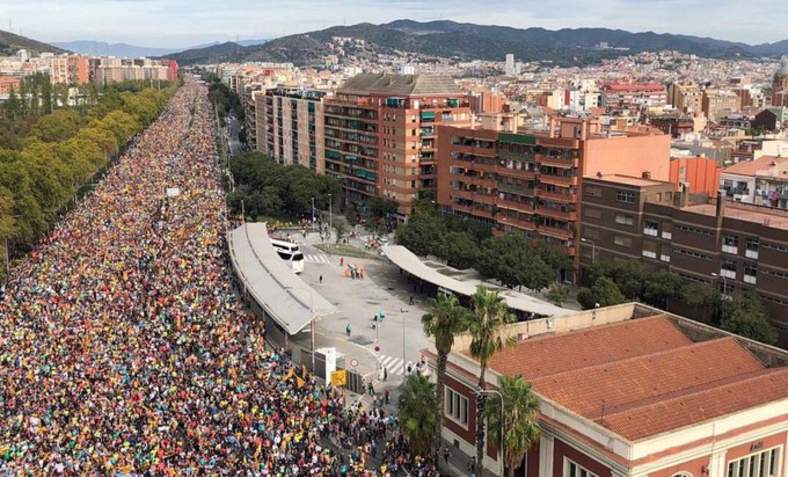 Up to 750,000 demonstrating in Barcelona today during the strike. A million are estimated to have turned out across the territory according to organisers. Photo: Assemblea Nacional
Up to 750,000 demonstrating in Barcelona today during the strike. A million are estimated to have turned out across the territory according to organisers. Photo: Assemblea Nacional
Hundreds of thousands marched in Barcelona and around the territory today in defence of democracy and their right to independence, reports Chris Bambery
Today much of Catalonia ground to a halt as the country saw a general strike (images below), the second day of a students strike and five mass marches from five cities converging on Barcelona where a demonstration of up to 750,000 (according to organisers) took place this evening, with main roads and motorways blocked by protesters.
This is the fourth day of a wave of protest in response to the Spanish Supreme Court handing out prison sentences totalling over 100 years to nine Catalan civic and political leaders charged with sedition in relation to the 1 October 2017 independence referendum.
Electricity use across the nation has fallen by over 10 per cent, indicating its impact. Catalonia’s biggest workplace, the SEAT car factory, told its 8,000 workers to stay at home, because the company says they “have to be able to guarantee that our workers and materials can arrive to the plant.” The Vueling airline has cancelled at least 36 flights, 18 arrivals and 18 departures from Barcelona airport. Many smaller businesses, shops and restaurants, have shut in solidarity. Dockers from Barcelona’s port joined the strike and blockaded Via Laietana in the city centre, where the Spanish National Police station is (it was a torture centre under the Franco dictatorship).
The strike was called by the pro-independence trade unions Intersindical-CSC and IAC – before the Spanish Supreme Court handed down the prison sentences – in support of their demands which include a higher minimum wage and measures to ensure gender equality.
The two unions have not specifically raised the jailings – Spanish law prohibits strikes for political objectives – but both support independence arguing it would benefit workers’ rights.
The Catalan components of the two biggest, Spanish wide, union federations, the CCOO and UGT, are not supporting the stoppage.
In truth the stoppage is more like a South African style stay-away rather than a traditional general strike with pro-independence activists blocking roads to stop people working and with 2,000 activists shutting down entry to Barcelona’s Sagrada Família. The actual strike will have been strongest in the public sector, notably education, though emergency services are guaranteed.
But there can be no doubting the support for the strike and the protests.
The five marches into Barcelona from five key towns, which set off three days ago, shut down highways as they entered the Catalan capital, where they were joined by many more residents of the city. There are also separate demonstrations taking place in other towns and cities – with thousands coming out in Girona, Tarragona and Lleida by the end of the day. They have been organised by Omnium, the mass membership Catalan cultural organisation, whose President, Jordi Cuixart, was jailed for nine years, and by the largest pro-independence civic organisation, the Catalan National Assembly (ANC), whose former President, Jordi Sanchez, was also jailed for nine years.
Early this morning protesters blockaded several roads including the country’s two main motor ways: AP-7 at La Jonquera, near the French border and AP-2 the route to Madrid at Tarrés.
On a second day of a strike by university, college and school students at least 25,000 took to the streets of Barcelona marching from Plaça Universitat to Plaça Sant Jaume, where the Catalan government and Barcelona city council are located. Among the slogans shouted were “independence”, “release political prisoners” and “I would imprison the monarchy”.
Xenia Cabeza, 18, said she was protesting ‘because they don’t let us vote in a referendum’ on secession. She carried a sign that read ‘You can’t imprison an entire people’.
In Girona over 4,000 students began their demonstration outside building of the Spanish government’s delegation shouting that they would take down the Spanish flag.
A group of university students, meanwhile, occupied the courtyard of the Rector’s Office at the University of Girona to call on him to cancel all activities that counts for credits or grades this week, not just “urge” his professors to do so.
In Lleida 700 students marched and in Tarragona 600 before they blocked the A-7 motorway.
The scale of the protests is rocking the Spanish state which has sent in extra security police who have been quick to use their batons and rubber bullets. Much of the media coverage has focused on a small minority of protesters who reacted by hurling back missiles and setting fire to refuse bins, but their numbers are dwarfed by those taking part in non-violent protests.
Non-violence is crucial to the Catalan independence movement whose leaders, including those in jail, and activists, are aware that the Spanish government and the Supreme Court judges want to paint a picture of a movement intent on a violent secession.
Meanwhile Spain is trying to extradite the Catalan President, Carles Puidgemont, once more. Puidgemont is in exile. By its actions the Spanish state, which is so determined to maintain its unity, is driving greater numbers of Catalans towards the exit door.

